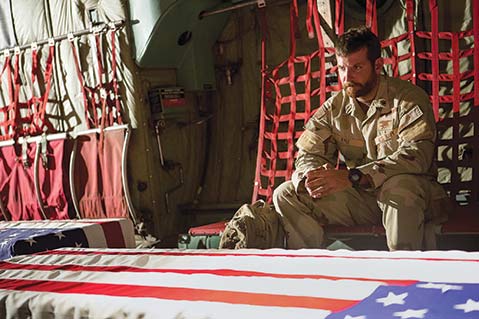Review: American Sniper
Bradley Cooper, Sienna Miller, and Kyle Gallner star in a film written by Jason Hall, based on the book by Chris Kyle, and directed by Clint Eastwood.

Clint Eastwood is not the jingoistic filmmaker that his mentor Don “Dirty Harry” Siegel was, no matter what the revisionist critics are saying. If anything, Eastwood is fiercely evenhanded in this engaging biopic about a Navy SEAL who served four tours of duty in our highly debated Middle East wars and cut down soldiers and suspect civilians from a distance, an assassin with an American heart. Eastwood’s version of Chris Kyle (Bradley Cooper) has a simplistic origin story: His “Rosebud” is a schoolyard bully beating; his “gift” is uncanny marksmanship. But the heroism and the obsessive single-mindedness generate a complex (and yet incomplete) aura around the man. The film could be seen as a simple illustration of the New Testament’s karmic utterance — He who lives by the sword dies by it — but it’s also a portrait made with painful ironies. Kyle runs into his little brother on an Iraq military tarmac, where the younger confesses his hero worship of “The Legend,” as big bro is known by then. But their parting words are more direct. “This place is fucked,” says little bro. Eastwood seems to agree.
This is engaging moviemaking, concise even though it indulges most of the clichéd aspects of contemporary war stories. Kyle’s wife (Sienna Miller) complains that he isn’t with his family even when he’s home. There’s the obligatory buddy with a wedding ring to give his girl when they get home. (You can guess what happens.) There’s even a bad Muslim Sniper so that we can get a worthy if predictable antagonist. Yet the film is very moving. The battle scenes are incredibly lucid but not as punishingly tense as those in The Hurt Locker. Cooper is terrific, beefed up and stolid, determined instead of crazy eyed. He carries the film, and Eastwood’s no-nonsense direction style pushes us through the melodramatic script moments.
American Sniper stays with you, though it’s not as compressed and poetically executed as Fury was. (A lot of the same themes about God, country, and the horror emerge.) The complainers claim Eastwood is celebrating a killer. But it’s also hard to name a war film that doesn’t.



